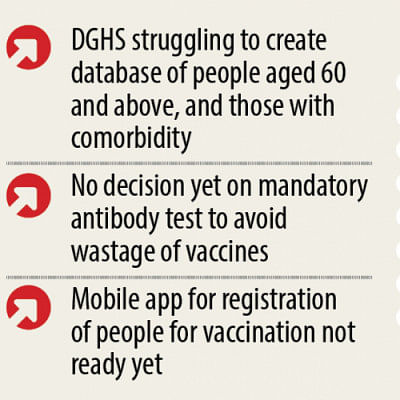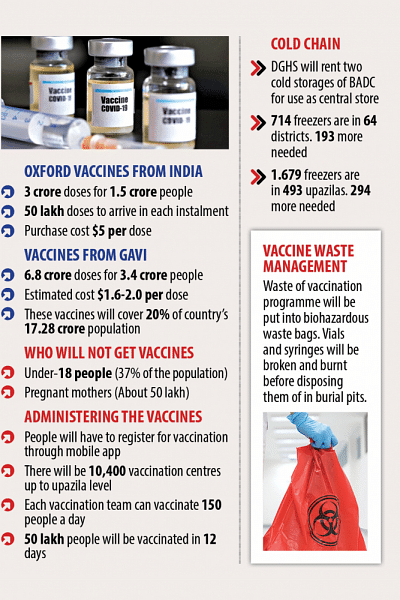Vaccine Rollout Plan: Key issues still unresolved

The government has yet to resolve several key issues before rolling out the Oxford-AstraZeneca vaccine, expectedly from the second week of February.
The mobile app for registering people willing to be vaccinated and to create a database of people aged 60 and above, those with comorbidities has yet to be launched.
Besides, the health care authorities of the country have yet to decide whether people to be vaccinated should go through mandatory antibody tests so as to avoid wastage of the much-sought-after coronavirus vaccine.
The country has so far arranged for the delivery of 9.8 crore doses of the vaccine -- 3 crore from Serum Institute of India and 6.8 crore from the COVAX facility -- to inoculate 4.9 crore people, each to be administered two doses.
Frontline healthcare professionals along with people aged 60 and above and those with comorbidities like cancer, diabetics and hypertension will be vaccinated in the first phase, according to Directorate General of Health Services (DGHS) officials.
Meanwhile, the DGHS has been struggling to prepare a database for the elderly people. Besides, there is also no database of people with comorbidities.
"We are working on it. We are exploring the NID database and that would make it easier for us to create an area-wise database of people aged 60 and above," DGHS DG Prof Abul Bashar Mohammad Khurshid Alam told The Daily Star on Sunday.
He did not say how long it might take to create the database.
The DGHS is still struggling to collect data on people with comorbidities, he added.
Public health experts said antibody tests would reduce wastage of vaccine doses.
Since many people are asymptomatic and have developed antibodies, the vaccine is not needed for them, they added.
The DG said the A2I (Access to information), health services department, and the ICT ministry have been working to develop a mobile app, which is considered the first step in the vaccination programme.
After completing the registration process, people will be notified through an SMS about the vaccination date and place. After vaccination, the DGHS will give people a vaccine card containing the batch number of the vaccine and its expiry date, said Prof Khurshid.
He said officials have started training the health workers and preparing the venues to vaccinate people.
Vaccines will be administered at various government hospitals and specialised hospitals across the country, said the DG.
In the first phase, vaccines will be given to frontline workers of different professional groups, he added.
The frontliners include health professionals, public representatives, government officials, law enforcers, defence personnel, freedom fighters, media personnel and religious leaders.

But not everyone in the aforementioned groups will get the vaccine in the first phase; those aged 60 and above and having comorbidities in those groups will get priority, said Prof Khurshid.
He said the government was preparing the priority list for vaccination in the first phase.
Bangladesh will get 50 lakh Oxford-Astrazeneca vaccine shots in each instalment every month from Serum Institute of India.
The government has given the emergency use authorisation (EUA) for the Oxford vaccine on Monday and has also disbursed advance payment of around $59 million. It was initially decided to administer vaccines to 25 lakh people each month, with each person to be given two doses.
Recent developments, however, suggest that the authorities might go for inoculating 50 lakh people at one go.
"We've got communication from various sources suggesting that the efficacy of the second dose of vaccine is higher if administered in the latter part of a 4-to-12-week timeframe after the first dose," said a DGHS official, preferring not to be named.
"In that case, we are planning to administer 50 lakh dozes at one go. It will also help relieve the pressure from the huge demand for the vaccine," the official said, adding that they were also in discussions to include the national cricket, football and hockey team players and officials in the first phase of the vaccination plan.
WHO WILL NOT BE VACCINATED
Although the government has initially planned to vaccinate 80 percent of the population, leaving the remaining 20 percent for herd immunity, the number may fall because of recent developments.
It was recently decided not to vaccinate people below 18 years of age. This age-group constitutes 37-40 percent of the country's over 170 million population, according to Bangladesh Bureau of Statistics data.
Besides, around 50 lakh pregnant mothers will not be vaccinated as a precaution in the first phase, said DGHS officials.
Those who were infected will also not be vaccinated. According to international protocol, those who were infected do not need vaccines as they have already developed antibodies, said an official.
According to updated DGHS data, 4,63,480 people have recovered till January 6.
VACCINE PROCUREMENT PLAN
The government has so far decided to procure those vaccines suited for the existing EPI (Expanded Programme on Immunization) cold chain, capable of storing vaccines in 2-8 degree Celsius.
The Pfizer-BioNTech Covid-19 vaccine, which has already been in emergency use in developed countries and has got the approval from the World Health Organisation (WHO), requires a cold chain of between -112 and -76 degree Celsius, which Bangladesh can ill afford with its existing cold chain.
In that context, Bangladesh has decided to purchase the Oxford-AstraZeneca vaccine, which has recently gotten approval in the UK and India for emergency use. The government has signed a tripartite agreement with Serum Institute of India and its local agent Beximco, a Bangladeshi pharmaceutical company, to buy three crore Oxford vaccine shots at a cost of $5 per dose.
The country is expected to get the three crore vaccine shots in six instalments, with the first instalment of 50 lakh expected to arrive in the country in the second week of February, said a DGHS official.
He said they were expecting to get vaccine shots from COVAX, a global vaccine alliance, not before May. Bangladesh would get vaccine shots for 20 percent of its population from COVAX, which is around 6.8 crore doses, at a cheaper price of around $1.6 to $2 per shot.
Officials said a coronavirus vaccine will arrive at the Hazrat Shahjalal International Airport from Pune via Delhi. From there it will be kept at a Beximco warehouse.
Nazmul Hasan Papon, managing director of Beximco Pharmaceuticals Ltd, told The Daily Star that each vaccine carton will contain temperature monitoring devices during transportation so that records of a 20-day cold chain could be preserved.
He said the vaccines will be transferred from the warehouses to government-designated sites.
"We will inspect physically in the airport. There would be various layers in the vaccine carton. We will finally open the carton in the government-designated place. The device will then give data of whether the temperature was compromised in any place," Papon said.
He said they are preparing a warehouse in Dhaka and also purchasing some specialised vehicles to transport vaccines from airport to warehouse to government-designated sites.
"We hope by January 15, all our work will be completed to receive the vaccines," he added.
Papon said a vial will consist of 10 doses of the vaccine.
The second dose should be administered 28 days after the first one, he added, hoping that if all approvals are fulfilled, the vaccines are likely to arrive at the end of January or early February.

 For all latest news, follow The Daily Star's Google News channel.
For all latest news, follow The Daily Star's Google News channel. 



Comments